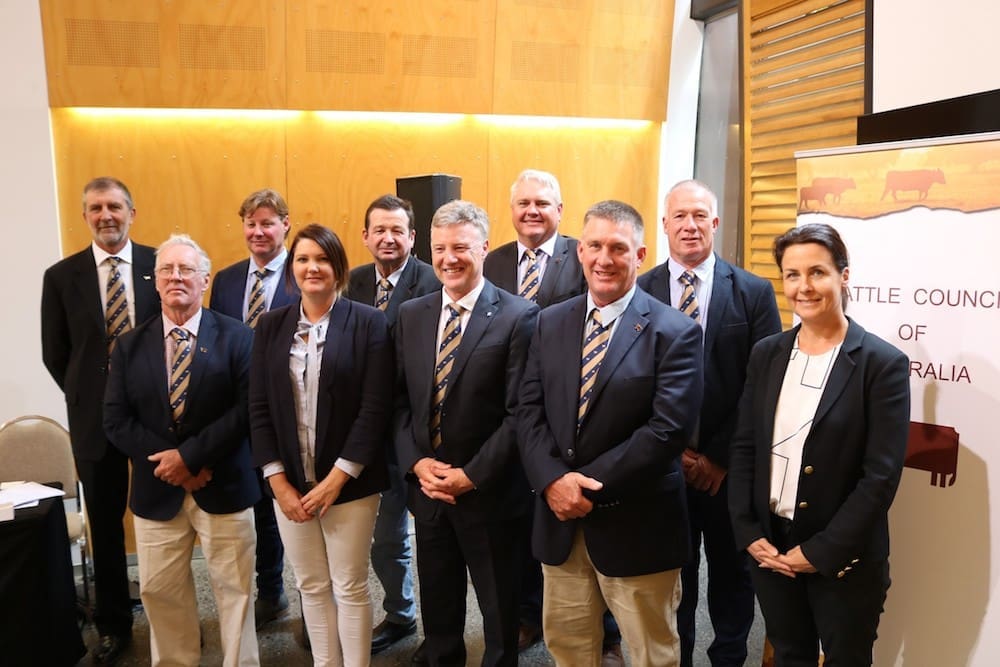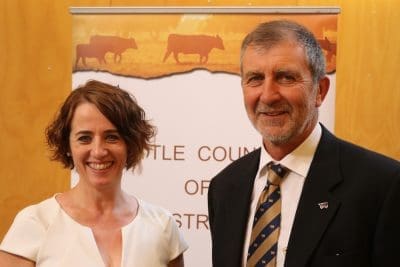
Cattle Council of Australia president Tony Hegarty (left) with members of the Cattle Council board: David Lovelock (Pastoralists & Graziers Association of WA); Geoff Pearson (WA Farmers); Amanda Giles (Livestock SA) Markus Rathsmann (NT Cattlemen’s Association); Brett Hall (Tasmanian Farmers & Graziers Association); David Hill (Independent Director – Northern); Lloyd Hick (AgForce); Peter Star (VFF); Olivia Lawson (Independent Director – Southern).
CATTLE Council of Australia has released more details of a proposed direct-elect model presented to yesterday’s annual general meeting in Canberra.
CEO Margo Andrae said the development of the model delivered on a commitment made by Cattle Council at the 2017 AGM.
“The model is the product of extensive consultation with our members and broader industry stakeholders, including a formal workshop in August. As a result of that extensive consultation, the direct-elect model has received widespread support from industry stakeholders,” Ms Andrae said.
“The next steps for the draft constitution and concept model, post the AGM, will be to undertake further consultation with Cattle Council founding members and the broader industry, with the aim of holding a special AGM in the first half of 2019, where the final constitution will be presented to members for adoption.”
“This is an industry-owned model, driven by industry. It will deliver increased transparency, with a rigorous and diligent policy development structure which embraces grassroots input from producers.
“As always, we strongly encourage cattle producers to be involved with their respective state-based representative organisations because it is a vital component of producer advocacy. And in keeping with our commitment to open consultation, we welcome the participation of the states in this process because they play such valuable role on behalf of producers.”
Outgoing CCA president Howard Smith alluded to the proposed model in this profile, published on Beef Central yesterday.
The new draft Board architecture delivers:
- Min 5 Max 7 State/Territory Directors – one per State/Territory maximum (Direct Elected)
- Min 2 Max 4 Appointed Directors – appointed by Board to fill skills/capabilities gaps
- Rigorous nominations process for all seats (elected and appointed) at board table
- 1 vote per Director
- 2-year terms (max 8 years, or 10 years for Chair/President)
- Increased membership options, including ability to include industry associates
Cattle Producers Australia challenges model
In a media release issued today Cattle Producers Australia (CPA) said a number of its committee members attended the CCA AGM yesterday to learn more about the CCA’s direct-elect model.
CPA chair Paul Wright said the model presented indicated that individual levy payers will vote for a traditional fiduciary board of directors who will have an oversight role, but policy will be developed and delivered by a series of consultative committees.
He said there was no confirmation that the members of these policy committees were to be democratically elected.
“The draft CCA proposal does not appear to satisfy the requirements of a truly democratic model for representation for grass-fed cattle levy payers. The CPA model does satisfy this criteria.”
Dr Wright said the representation of SFO’s and independents was not even in the proposed model. He said CCA Chair Howard Smith told the meeting the CCA relied heavily on SFO’s and their membership fees so they had a right to have members on the consultative committees.
Dr Wright said SFO contribution represented “a relatively small proportion of the total CCA budget”, the main contributors being Red Meat Advisory Council (RMAC) and Meat and Livestock Australia (MLA).
He said he believed there were democratic discrepancies in the new CCA draft model because the direct elect board that comes from a levy payer vote does not actually appear to develop or deliver policy, they only oversee and endorse the policy created by the committees.
“This is a real concern for the industry, after all the senate inquiries and industry studies that have provided recommendations for reform, we are still being dealt a false sense of democracy by industry leaders.”
He said the Implementation Committee formed in response to the 2014 senate inquiry was established with members including CCA representatives and tasked with developing a new democratic model to replace CCA as the Peak Council to aid with launching reform in the industry.
He said recommendations from the 2017 Senate inquiry into the Effect of Market Consolidation on the Red Meat Processing Sector stated that the Australian Government should support Cattle Producers Australia and ensure that adequate funding was made available to Cattle Producers Australia to achieve this objective.
Funding of $500,000 from the Leadership in Agriculture Fund was approved to fund the Implementation process in October 2017. This funding stream has been held in abeyance by the Department of Agriculture owing to the untimely withdrawal by the CCA from the reform process in January 2018.
Sources: Cattle Council of Australia, Cattle Producers Australia


“When are we going to stop bashing the Cattle Council of Australia”
I would say when they stand up to the career bureaucrats and say NO to the next stupid decision that gets lumped onto producers with no meaningful outcome for the majority.
Do not think this is just confined to the beef industry, talking to a project manager in the urban construction industry and they said their industry body thinks up all these unnecessary regulatory schemes that cost the industry money with little to no better outcomes for the majority of the industry. You have to remember career bureaucrats need to continue to create crises lest their jobs become unnecessary. The leadership as a group needs to stand up to them, even if it means they might put their career into jeopardy.
When are we going to stop bashing the Cattle Council of Australia and unite behind it to ensure we have the best chance of continuing to improve what is our industry body?
I sit on one of the four consultative committees that provides policy advice to the board of Cattle Council and as a young central QLD cattle producer I feel it is a great example of how we, as industry stakeholders can be involved for the betterment of our industry.
Under renewed leadership there have been many steps implemented to improve governance to allow better organisational function, accountability and pathways for industry to have their say.
It appears that the continued criticism from naysayers has gone well beyond a genuine desire to improve outcomes for the cattle industry and is simply a bunch of people with an axe to grind.
Let’s get behind our industry body as there has never been a more critical time to do just that.
This is just window dressing.Paul Wright is spot on CCA receive $950 000 from the beef tax and over $500 000 from RMAC(dividens from past levies) and a bit over $200 000 from SFO s.I am forced to fund CCA even though I am opposed to their policies by The National Party who have reneged on their promise to abide by the Senate recommendations. The National Party has endorsed compulsory unionism.